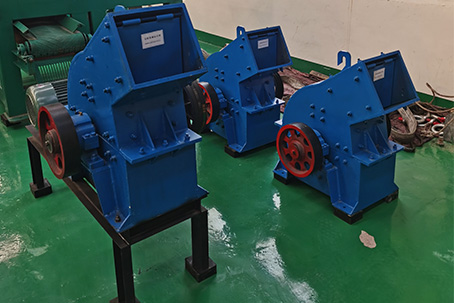


The Indian mining sector has long been a cornerstone of the nation's economic development, providing essential raw materials for various industries. Among these materials, river pebbles have gained significant attention due to their unique properties and applications. This article delves into the processing of river pebbles using granite crushers within the Indian mining sector, highlighting the processes, benefits, challenges, and future prospects.
Understanding River Pebbles
River pebbles are naturally rounded stones found in riverbeds, formed through the weathering and erosion of rocks over centuries. These pebbles are composed mainly of quartz, feldspar, and other minerals, making them highly durable and resistant to wear and tear. Their smooth texture and uniform size make them ideal for construction purposes, landscaping, and even as aggregates in concrete production.
The Role of Granite Crushers
Granite crushers play a crucial role in the processing of river pebbles. These machines are designed to crush large rocks into smaller, more manageable pieces, facilitating further processing and utilization. In the context of river pebble processing, granite crushers are used to break down the pebbles into finer aggregates suitable for various applications.
Types of Granite Crushers
1. Jaw Crushers: Ideal for primary crushing, jaw crushers use compressive force to break down large rocks into smaller sizes. They are known for their high crushing ratio and ability to handle abrasive materials like granite and river pebbles.
2. Impact Crushers: Suitable for secondary and tertiary crushing, impact crushers utilize high-speed impact to shatter rocks into smaller fragments. They are particularly effective in producing fine aggregates with a cubical shape, which is desirable for construction purposes.
3. Cone Crushers: Cone crushers are commonly used for secondary and tertiary crushing stages. They operate by squeezing rock between a rotating mantle and a stationary bowl liner, resulting in high-quality aggregates with minimal fines.
4. VSI (Vertical Shaft Impactor) Crushers: VSI crushers are specialized machines designed to produce high-quality sand and aggregates. They use a rotor that throws rocks against an anvil or a rock bed, generating a high-energy impact that results in finely shaped particles.
Processing Steps
The processing of river pebbles using granite crushers typically involves several stages:
1. Feeding: River pebbles are fed into the crusher through a vibrating feeder, ensuring a steady and controlled flow of material.
2. Primary Crushing: Jaw crushers are often used for primary crushing, reducing the size of the pebbles to a manageable level.
3. Secondary and Tertiary Crushing: Depending on the desired final product size, the crushed pebbles may undergo secondary and tertiary crushing using impact or cone crushers.
4. Screening: After crushing, the material is screened to separate it into different size fractions. Vibrating screens are commonly used for this purpose.
5. Shaping: For applications requiring specific particle shapes, such as in construction, VSI crushers may be employed to refine the aggregates further.
6. Washing: To remove any impurities or clay, the processed aggregates may undergo washing using water or air separation techniques.
7. Drying: Finally, the washed aggregates are dried to ensure they meet the required moisture content standards.

Benefits of Using Granite Crushers in River Pebble Processing
1. Efficiency: Granite crushers offer high efficiency in processing river pebbles, enabling large volumes of material to be handled in a short time.
2. Quality Aggregates: The use of advanced crushing technologies ensures the production of high-quality aggregates with consistent size and shape, enhancing their suitability for various applications.
3. Versatility: Different types of granite crushers can be combined to achieve the desired final product specifications, providing flexibility in processing.
4. Durability: Granite crushers are designed to withstand the rigors of continuous operation, reducing maintenance costs and downtime.
5. Environmentally Friendly: Modern crushers are equipped with dust suppression systems and noise reduction features, minimizing environmental impact during processing.
Challenges and Considerations
Despite the numerous benefits, there are several challenges associated with river pebble processing using granite crushers:
1. Initial Investment: The cost of purchasing and installing granite crushers can be substantial, posing a barrier for small-scale miners and processors.
2. Maintenance: Regular maintenance is essential to ensure optimal performance and longevity of the equipment, adding to operational expenses.
3. Energy Consumption: Crushing operations are energy-intensive, contributing to higher operational costs and environmental concerns related to energy usage.
4. Regulatory Compliance: Adhering to environmental regulations and safety standards requires additional investments in pollution control measures and worker training.
Future Prospects
The future of river pebble processing with granite crushers in the Indian mining sector looks promising, driven by advancements in technology and increasing demand for quality aggregates. Key trends shaping the industry include:
1. Automation and Digitalization: The integration of automation and digital technologies will enhance process efficiency, reduce human intervention, and improve overall productivity.
2. Sustainable Practices: Emphasis on sustainable mining practices and circular economy principles will encourage the development of eco-friendly crushers and recycling methods.
3. Innovation in Crushing Technology: Ongoing research and development efforts aim to introduce more efficient and energy-saving crushing solutions, reducing operational costs and environmental footprint.
4. Market Expansion: As infrastructure projects continue to grow across India, the demand for high-quality aggregates is expected to rise, fueling further investments in river pebble processing facilities.
In conclusion, the processing of river pebbles with granite crushers plays a vital role in the Indian mining sector, offering numerous benefits while presenting certain challenges. With continued technological advancements and a focus on sustainability, the industry is poised for growth and innovation, contributing significantly to India's economic development and infrastructure expansion.